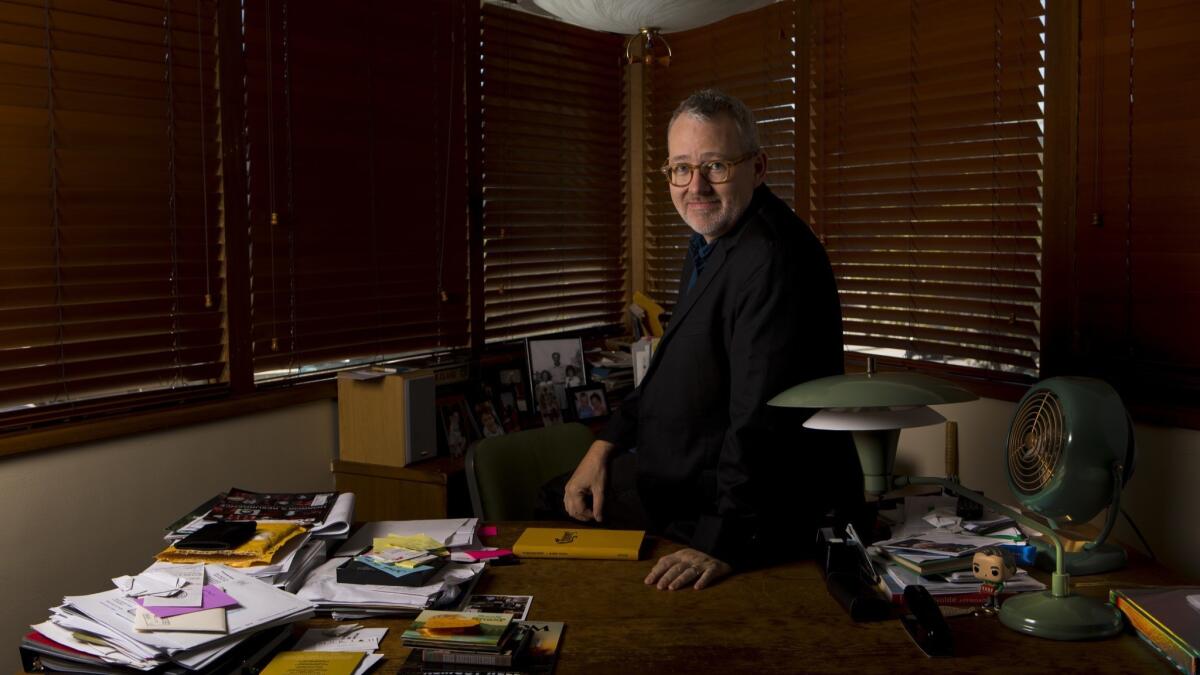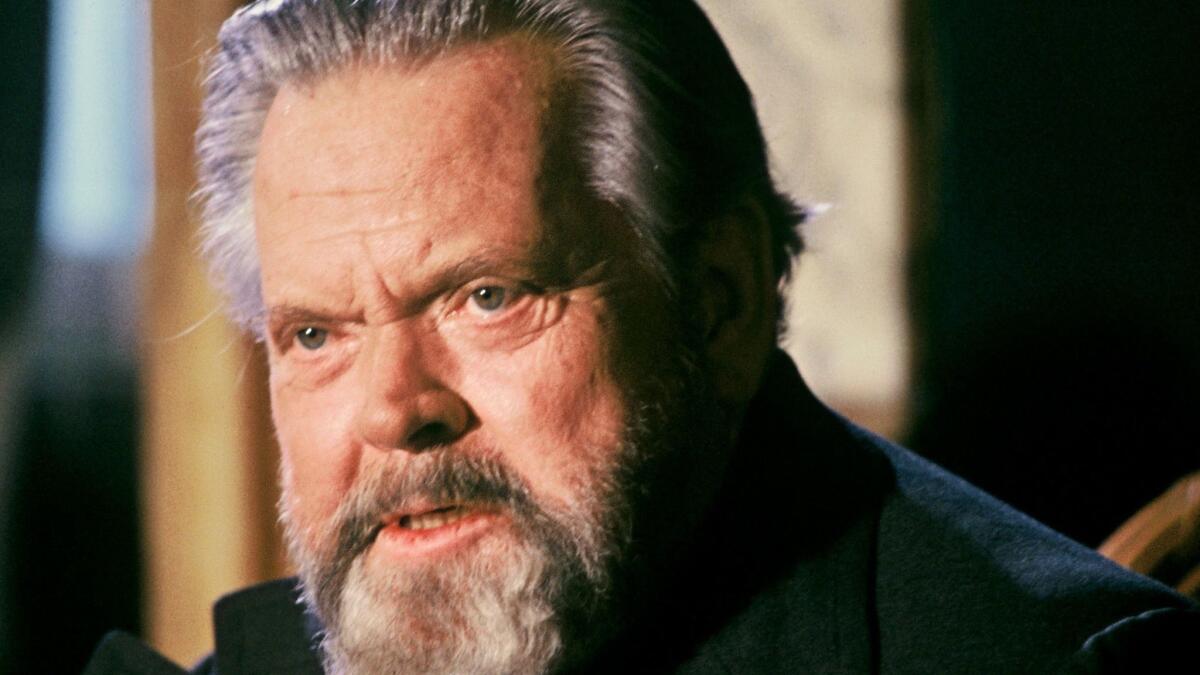Following his hit Mister Rogers documentary, director Morgan Neville examines Orson Welles’ long-lost final film

It would be hard to think of two cultural figures more different from one another than Mister Rogers and Orson Welles. But if you drew a Venn diagram of the kindhearted children’s television host and the pioneering but ultimately tragic director of “Citizen Kane,” in the middle you’d find documentary filmmaker Morgan Neville.
This summer, the 51-year-old Neville had a $22-million sleeper hit at the box office with his documentary about Rogers, “Won’t You Be My Neighbor?” Now the filmmaker — who won an Oscar in 2014 for his film about background singers, “20 Feet From Stardom” — is back with “They’ll Love Me When I’m Dead,” which recounts the strange and twisty story behind Welles’ long-lost final film, “The Other Side of the Wind.”
“They’ll Love Me When I’m Dead” will be available to stream on Netflix on Friday along with the recently unearthed and finished “The Other Side of the Wind,” which is also receiving a limited theatrical release.
A brazenly experimental documentary-style drama centered on an aging filmmaker, “The Other Wide of the Wind” was to be Welles’ magnum opus but the troubled production was beset by financial difficulties and never completed. For decades, more than a thousand reels of footage languished in a Paris vault, bogged down in legal disputes. Finally, last year producer Frank Marshall, who was a production manager on “Wind” early in his career, and Filip Jan Rymsza managed to rescue and finish the film with a major assist from Netflix, which kicked in $5 million in completion funds.
Though the turbulence and ultimate sadness of Welles’ final years couldn’t be more removed from the largely sunny story of Mister Rogers, “They’ll Love Me When I’m Dead” producer Korelan Matteson said what links the two docs is Neville’s roving curiosity.
“Regardless of the subject matter that Morgan chooses, he has this sort of motto that he goes by that he doesn’t want to give people neat and tidy answers,” Matteson said. “As a storyteller, he wants to provoke questions and leave you wondering and thinking.”
In late August, shortly before “They’ll Love Me When I’m Dead” premiered at the Telluride Film Festival, The Times spoke with Neville about the film, his long fascination with Welles and the state of documentaries as a whole.
How did “They’ll Love Me When I’m Dead” first originate?
I’ve been a lifelong Welles fanatic but I never thought I would make a film about him because I didn’t see an opportunity to tell a unique story. When Josh Karp’s book [“Orson Welles’ Last Movie: The Making of ‘The Other Side of the Wind’”] came out maybe four years ago, I read it and just loved it. I thought, “Well, this is something I didn’t know anything about in Welles’ life.” I remember thinking, “If I could ever get the footage, I’d love to make a documentary about this.”
I wanted to focus on the last 15 years of Welles’ life. He comes back to Hollywood in 1970 as the godfather of the New Hollywood. It should have been such a fertile time from a business point of view for him, and he never made another scripted movie. Why that happened is the central question I wanted to ask — and as with all things Welles, there’s no one answer. With almost everything Welles, truth in his universe becomes kaleidoscopic.
With almost everything [Orson] Welles, truth in his universe becomes kaleidoscopic.
— Director Morgan Neville

REVIEW: All Welles breaks loose in the corrosive, long-awaited ‘The Other Side of the Wind’ »
People have an image of Welles in his later years as being this slightly pathetic, washed-up figure peddling Paul Masson wine on TV, but you show that he remained a maverick filmmaker right up until the end. Did your perception of him change as you delved into the documentary — and are you hoping to change other people’s perceptions?
Yeah, it certainly deepened my understanding of him considerably. He was probably the most complex person I’ve ever made a film about. He was such a protean character. I think he was really somebody who was a different person depending on the day and the company and everything else. There were times when he was doing things that were undignified and there were other times when he was the most adventurous maverick you could aspire to be. He was all of these things.
Part of the problem in the public’s perception is that Orson had drawn a line between acting and directing. He said, “Acting to me is a base art form and I’m happy to prostitute myself to take as much money as I can. But when it comes to directing, I remain virginal.” I don’t think the public understood that line that he was drawing.
The other thing is, when I talk to younger people, Orson in general is fading a bit. Maybe not the cineastes among us but the average person under 30 probably doesn’t know who he is. I guess what inspired me about it is: Here is somebody who is more bold and daring than most of our indie auteurs, doing things that are so ahead of their time and out of time that he just deserves credit for that. I found that part very inspiring.
Judging solely by your film, it’s hard to tell whether “The Other Side of the Wind” is this great lost work or just a fascinating mess. Did you watch the movie while you were making the documentary and form your own opinion?
Not until I was just about done. I had other people watch it. I just wanted to stay focused on my movie without thinking about that, and then at the end I looked at it and said, “Are there moments here where I’m really missing something?”
I want people to decide for themselves. I’m looking at it through a very specific kind of prism. I guess I would just say that, like with Orson and most of his art, there’s no one way to see it. I think how I feel about the film changes with the day and the mood and the temperature.
In a way, I think “The Other Side of the Wind” is still a mystery. What would Orson have done? Should it even have been attempted to finish it? These are sort of unanswerable questions.
I think one of the reasons documentaries are so popular now is that Netflix put them on an even playing field ... and people were able to discover them.
— Director Morgan Neville
Netflix has become a huge player in documentaries in the past few years but a lot of people in the industry still view them as this scary 800-pound gorilla. You’ve now done several projects with them, so I assume you see them as a force for good.
I think it would be hard to find a documentary filmmaker who didn’t. I think one of the reasons documentaries are so popular now is that Netflix put them on an even playing field with every other kind of movie and people were able to discover them. For years, making documentaries, I always heard, “I love documentaries but I don’t know where to find them.” I think both the quality of the films and the appetite has been a huge boon to documentary.
Sure, people can nitpick with this or that about Netflix or about anybody. But I think by and large the net positive is huge for documentary filmmakers. With a film like “The Other Side of the Wind,” who else was going to put up the money to save it? For 40 years they tried to find somebody who would and nobody would. Netflix is the only place that would have done it. So if it wasn’t for them, these films would not exist in the world.
At the same time, your Mister Rogers documentary was a big hit in theaters earlier this year, as was the Ruth Bader Ginsburg documentary “RBG.” Is there any concern that Netflix could start to hurt the theatrical distribution of those kinds of films?
It’s hard to say that it’s been killing theatrical documentaries after a year like we’ve had. I think if anything it could be the opposite, which is that it’s brought in a much bigger audience for documentaries in general that can spill over into theatrical or streaming or what-have-you.
I feel like it’s all incredibly positive right now. My inner pessimist is like, “OK, what’s next?” Because I’ve been doing this long enough that I’ve seen the waves of how the business has changed and there have been so many ebbs and flows in documentary. But the overall trajectory has been higher and higher.
Twitter: @joshrottenberg
More to Read
Only good movies
Get the Indie Focus newsletter, Mark Olsen's weekly guide to the world of cinema.
You may occasionally receive promotional content from the Los Angeles Times.











